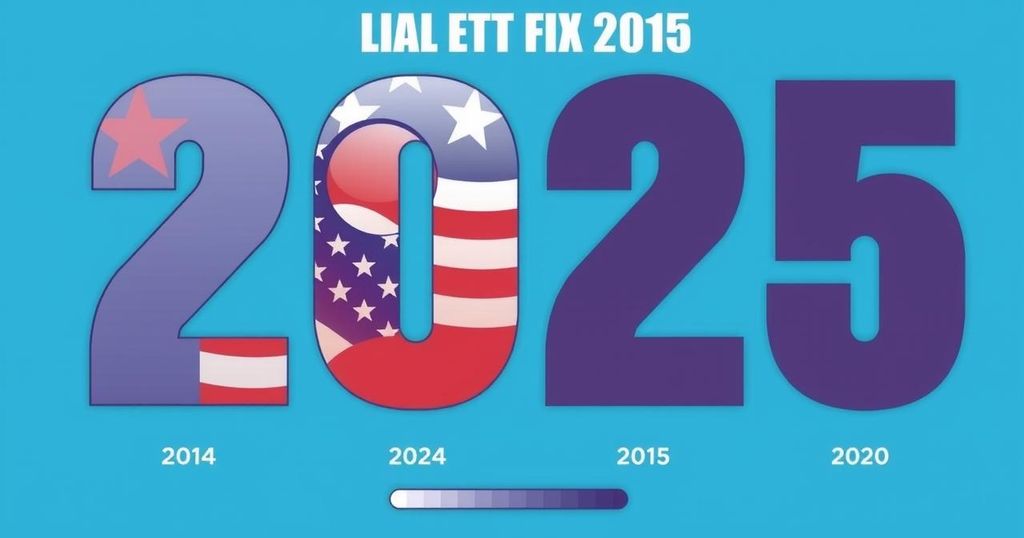Key elections in 2025 include gubernatorial races in Virginia and New Jersey, a critical Supreme Court election in Wisconsin, and major mayoral contests, particularly in New York City. Special elections in Florida and New York are also expected, reflecting the increasingly competitive political landscape following the 2024 presidential race.
In 2025, key gubernatorial elections are set to unfold in Virginia and New Jersey, alongside potentially pivotal Supreme Court races in Wisconsin. Historical trends suggest that gubernatorial contests following presidential elections often favor the party that lost the presidency. Virginia’s election will see an open race due to incumbent term limits, likely featuring nominees Winsome Sears and Abigail Spanberger. In New Jersey, the race will attract various Democratic contenders, with Democrats hoping to maintain control despite recent Republican gains. The Wisconsin Supreme Court seat vacancy holds significant implications for pending legal decisions, while mayoral elections in major cities, particularly New York, will add to the electoral landscape. Furthermore, special elections for the U.S. House in Florida and New York are anticipated amidst a closely divided Congress, underscoring their potential impact on party dynamics.
The upcoming electoral landscape in 2025 will see significant elections shaping the political landscape at both state and federal levels. This includes crucial gubernatorial races, notably Virginia’s and New Jersey’s, where incumbent limitations create open contests likely influenced by previous presidential races. The dynamics in Virginia suggest favorable conditions for the Democratic Party, whereas the Republican Party is eyeing New Jersey following tighter margins in recent elections. Additionally, the Wisconsin Supreme Court race will play a critical role in shaping legislative outcomes, particularly concerning issues like abortion and labor rights. Mayoral elections in prominent cities, particularly New York, alongside special House elections, will further highlight the competitive nature of the political environment as the country approaches mid-decade assessments.
Virginia’s gubernatorial election is particularly noteworthy due to the state’s unique law that forbids incumbents from running for consecutive terms. With historical precedent showing that the party not in the White House typically fares well, the Democratic candidate Spanberger is positioned against Republican Sears, paving the way for a potential historic election outcome. New Jersey, having recently shown tighter margins in gubernatorial contests, may offer Republicans an opportunity while presenting various Democratic candidates in a crowded primary. Concurrently, Wisconsin’s Supreme Court seat becomes pivotal, especially amidst ongoing debates on critical social issues.
As various mayoral elections unfold, attention remains centered on New York City, where current Mayor Eric Adams’s reelection bid will likely be influenced by a June primary amidst legal challenges. Additionally, the anticipated special elections in Florida and New York’s 21st District could influence congressional party control in the exceedingly narrow House majority. The 2025 elections will thus serve as a vital test for both state and national political landscapes, setting the stage for future electoral cycles.
The significance of the 2025 elections stems from the political trend observed in the year following a presidential election, typically benefiting the party that lost the White House. This phenomenon is particularly evident in state races, where the dynamics can shift control at both gubernatorial and legislative levels. Virginia and New Jersey are prime examples of this trend, while Wisconsin’s Supreme Court race holds critical implications for state judicial decisions. The outcomes of these elections will lend insight into the wider political mood of the electorate and potential shifts leading into the subsequent national elections.
The electoral events of 2025 promise to be pivotal for both state and national politics, with gubernatorial races in Virginia and New Jersey likely shaping future party dynamics. The Wisconsin Supreme Court election could influence key legal interpretations while mayoral contests in cities such as New York will highlight local governance challenges amidst a broadly competitive atmosphere. Lastly, anticipated special elections in Florida and New York will serve as further indicators of party strength in a Congress that is highly divided, intensifying the stakes for both major political parties.
Original Source: abcnews.go.com






